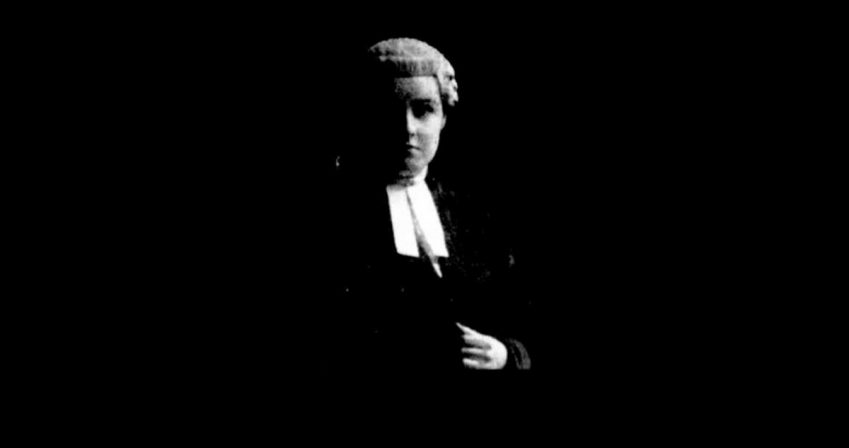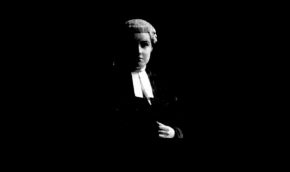First woman from Western Australia to be called to the Bar
Women in Law
- Introduction
- Timeline
- Joyce Bamford-Addo
- Marion Billson
- Jill Black
- Elizabeth Butler-Sloss
- Sue Carr
- Eugenia Charles
- Lynda Clark
- Freda Corbet
- Coomee Rustom Dantra
- Leeona Dorrian
- Heather Hallett
- Frene Ginwala
- Rosalyn Higgins
- Daw Phar Hmee
- Lim Beng Hong
- Dorothy Knight Dix
- Sara Lawson
- Elizabeth Lane
- Theodora Llewelyn Davies
- Gladys Ramsarran
- Lucy See
- Evelyn Sharp
- Victoria Sharp
- Ingrid Simler
- Teo Soon Kim
- Ivy Williams
- The Significance of the Sex Disqualification (Removal) Act 1919
- Women in Law Podcasts
Home › Women in Law › Pioneering Women in Law › Auvergne Doherty
Auvergne Doherty
Listen to Charlotte Coleman Discuss Auvergne Doherty
0:00
-0:00
1896 – 1961
Auvergne Doherty was born on 3 October 1896 in Perth, Western Australia.[i] She was the first Australian and Commonwealth citizen (from Western Australia) admitted to Middle Temple on 5 January 1920 and subsequently called to the Bar just over two years later, on 17 November 1922.
Doherty attended school in Western Australia for a time before being educated abroad in England.[ii] An Australian newspaper, Table Talk, commented that it was Doherty’s role as Portia in a school performance of Shakespeare’s play, Merchant of Venice, that inspired her to become a barrister: Doherty was considered a "brilliant student" and "gave earnest promise of achieving her ambition of wearing the wig and gown of Portia, in real life".[iii]
In 1916, Doherty registered as a student at Oxford University as a Home-Student (meaning she lived at home as opposed to staying in one of the Colleges). She gained a Fourth-Class Honours in the Final Honour School of Jurisprudence in June 1920.[iv] There were two other women Home-Students studying Jurisprudence at the same time: Olive Clapham, who was called to Middle Temple on 17 November 1924 and the first woman to pass the Final Bar Examinations in 1921;[v] and Gwendoline Peterson, who became a solicitor.[vi]


Auvergne Doherty
During one of the compulsory dining events, it is recorded that Doherty sat with Miss Cobb (MT, 1922), and Miss Bruce;[vii] Helena Normanton sat on the adjoining table with Mr Hubert Sweeny and Mr Holford Knight.[viii] After completing the necessary terms of dining and passing her Bar Final with a Second-Class,[ix] Doherty was called to Middle Temple on 17 November 1922. As reported in, The Vote, the women were led by Helena Normanton to the table where they dined in their black gowns and wigs.[x]
Doherty appeared in the Law Lists from 1923 until at least 1932;[xi] however, she did not achieve pupillage or practise as a barrister; her ambition was thus thwarted. Instead, she worked as a secretary for the British Drama League.[xii] While Doherty was not alone in seeking and undertaking work outside the law,[xiii] it is likely that her position at the British Drama League would have satisfied the need for paid work — something that was necessary due to her family’s declining financial circumstances.[xiv] To make matters worse, her mother died suddenly in London on 20 February 1928, at around 58 years of age.[xv] Doherty’s father allegedly suffered a breakdown due to his wife’s death and his declining financial means.[xvi] In 1930, Doherty returned to Perth with her father and sister, Dorothy. Doherty took over the running of the company with her sister when her father died in 1935.[xvii]
In her role of Company Director, Doherty was considered the ‘backbone’ of the organisation, going above and beyond the call of duty.[xviii] One newspaper commentated that she became known by the locals as ‘The Big Boss’.[xix] Surprisingly, she also fought against her company’s interests for compensation for injured workers and unfair dismissal. In one specific case, she represented Mr F. Hales, the Fremantle Wool and Grain Store Manager for C.D.&D., whom she saw as having got a poor deal when the stores were sold.[xx]
On 4 December 1946, Doherty resigned from her position as Company Director probably due to ill-health.[xxi] When she died, on 3 January 1961, Doherty was nearly penniless: after the death taxes of £80 were deducted from the estate, her total property was only worth £25.[xxii] Poignantly, her gravestone marks her entrance to London Bar: B.L.L., 1922,[xxiii] evidencing that she wanted to be remembered for this achievement.
Charlotte Coleman
[i] Western Australia Death Certificate for Auvergne Doherty (on file with author).
[ii] Doherty is noted to be a pupil at a school in Western Australia in ‘Advance Australia Fair’, Table Talk (Melbourne, Victoria), 30 November 1922, 10. Later, when her family travels to England, she attends English schools including St Bernard’s preparatory and the Convent of the Holy Child Jesus. The Times Obituary notes that she was also educated in Belgium; however, I have not found evidence of this yet.
[iii] ‘Advance Australia Fair’, Table Talk (Melbourne, Victoria), 30 November 1922, 10.
[iv] Email to Clare White, archivist for the Society of Oxford Home Students on June 28, 2017. Doherty’s Student Register entry at Oxford University confirms that she gained a Fourth-Class Honours in the Final Honour School of Jurisprudence in June 1920.
[v] ‘First Woman to Pass the Final Bar Examination’, Western Times, May 27, 1921,14.
[vi] Email to the archivist for the Society of Oxford Home students (Oxford University) on March 7, 2018, confirmed Olive Clapham was registered in Michaelmas term in 1916 and was a member of the Society of Home-Students.
[vii] Miss Bruce was admitted to Middle Temple in 1920 but was not called.
[viii] ‘An Historic Occasion’, The Vote, January 16, 1920, 466.
[ix] As detailed on Doherty’s Student Register Entry, Oxford University Archives, Doherty achieved a Second-Class in her Bar Finals also confirmed in ‘Bar Examination Results’, Common Cause, January 20, 1922, 1.
[x] ‘Our Women Barristers’, The Vote, November 24, 1922, 370.
[xi] Law Lists 1923-1932 (London, Stevens).
[xii] ‘Obituary for Miss Auvergne Doherty’, The Times (London, England), January 19, 1961, 17. The British Drama League originated in 1919 with the aim of assisting the development of the Art of the Theatre and its relationship with the life of the Community.
[xiii] Carrie Morrison, the first woman to be admitted as a solicitor in England and Wales, noted that she also undertook a secretarial course, hoping to get a job as a political secretary, before she met Mr Alfred Baker, to whom she was articled. See ‘Women Lawyers: Girl Who Likes Crime Cases Best’, Dundee Evening Telegraph, October 31, 1922, 4. Some women pursued careers in other areas of the law, becoming a solicitor, teaching or textbook writing. Others joined the Civil Service or worked for women’s organisations and other areas; Elizabeth Barber, for example, called in 1935 at Gray’s Inn, was Secretary and later General Secretary of the Society of Authors.
[xiv] Email to Marina Loane on April 11, 2017 containing Patsy Millett, archive notes.
[xv] ‘Deaths. Doherty’, West Australian (Perth, WA), February 24, 1928.
[xvi] Email to Marina Loane on April 11, 2017 containing Patsy Millett, archive notes.
[xvii] Ibid.
[xviii] Ibid.
[xix] Obituary for Miss Auvergne Doherty, The Times (London, England), January 19, 1961, 17.
[xx] Ibid.
[xxi] Millett email, 2017.
[xxii] Western Australia, Death Certificate for Auvergne Doherty.
[xxiii] Grave Index, ‘Auvergne Doherty’, https://search.ancestry.com.au/cgi-bin/sse.dll?indiv=1&dbid=60528&h=2338436&tid=&pid=&usePUB=true&_phsrc=qr1-2124621&_phstart=successSource (last accessed: 08/11/2019).